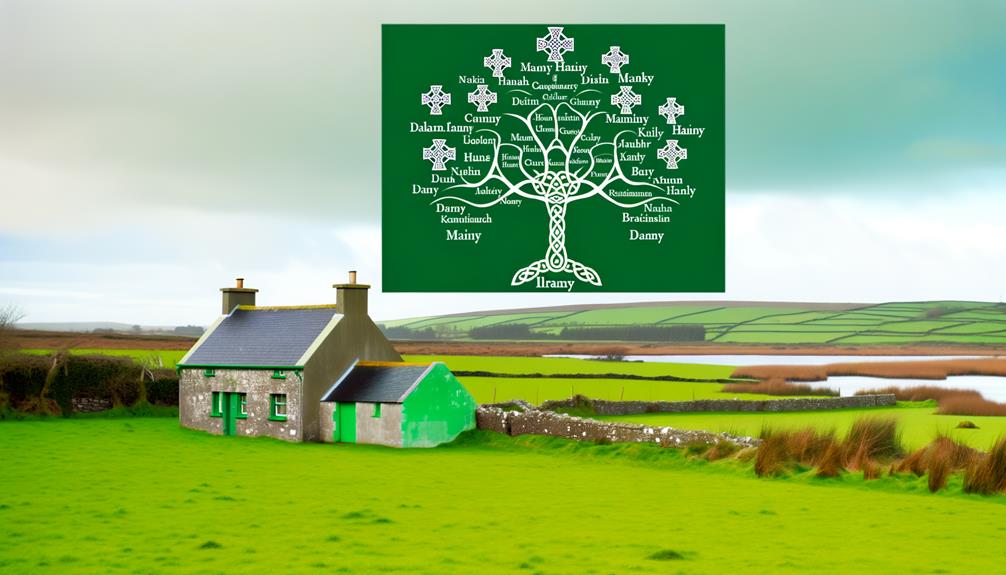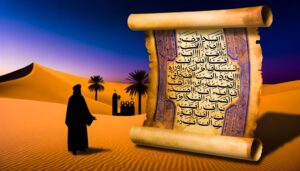Irish Name Meaning in English
Irish names have deep historical and cultural importance, often derived from ancient Gaelic roots. Names like 'Aoife' mean 'beauty' or 'radiance,' while 'Conor' signifies a 'lover of hounds.' Traditional prefixes such as 'Mac' and 'Ó' reflect familial connections.
Mythology also plays a pivotal role, with many names originating from heroic legends and deities, like 'Cúchulainn' and 'Brigid.' Regional variations exist, influenced by phonetic differences and historical factors. Anglicization transformed many names to align with English pronunciation norms yet retained much of their original essence.
Examining these elements further reveals a rich tapestry of Irish cultural and linguistic history.

Key Takeaways
- 'Aoife' means 'beauty' or 'radiance' in English.
- 'Conor' translates to 'lover of hounds.'
- 'Sean' is the Irish variant of 'John.'
- Many Irish names derive from mythological figures and heroic legends.
- Gaelic origins often denote lineage, geography, or personal characteristics.
Popular Irish Names
Examining popular Irish names reveals a rich tapestry of history and linguistic evolution, reflecting the island's complex cultural heritage. Names such as 'Aoife' (pronounced EE-fa), deriving from Old Irish 'Aífe,' meaning 'beauty' or 'radiance,' and 'Conor' (Conchobhar), meaning 'lover of hounds,' illustrate the integration of ancient mythological and societal elements into personal identities.
The name 'Sean' (Seán), an Irish variant of 'John,' shows the influence of Anglo-Norman and later English cultural impositions. These names often carry etymological roots that highlight the Gaelic language's phonetic and morphological characteristics.
Consequently, popular Irish names not only signify individual identity but also encapsulate historical narratives and linguistic transformations, offering insights into Ireland's evolving cultural landscape.
Ancient Gaelic Origins
The ancient Gaelic origins of Irish names are deeply rooted in the linguistic and cultural traditions of early Celtic society, reflecting a profound connection to Ireland's mythological, social, and historical contexts.
The lexicon of Gaelic names often includes elements that denote lineage, geographical features, or personal characteristics. For instance, prefixes like 'Mac' (son of) and 'Ó' (descendant of) signify familial connections, while names such as 'Áine' (brightness) and 'Brían' (noble) highlight personal attributes.
The syntax and morphology of these names mirror the Old Irish language structure, revealing an intricate system of inflection and compounding. This linguistic heritage underscores the continuity and adaptability of Gaelic nomenclature through centuries of socio-political changes and linguistic evolution.
Mythological Influences
The influence of Irish mythology on names is profound, with many names deriving from heroic legends and deities.
Names like 'Cúchulainn' and 'Deirdre,' for instance, originate from mythological figures whose stories are deeply embedded in Irish folklore.
This intersection of language and mythology provides rich insights into the cultural and historical significance of these names.
Heroic Legends and Deities
Many Irish names derive their meanings from heroic legends and deities, reflecting the rich mythological tapestry of ancient Ireland. These names often encapsulate the essence of legendary figures, such as the valiant hero Cú Chulainn or the revered goddess Brigid.
Through etymological analysis, one can observe how these names are linguistically constructed, often involving Old Irish or Proto-Celtic roots. For instance, 'Brigid' originates from the Proto-Celtic *Brigantī, meaning 'high' or 'exalted,' mirroring her status as a goddess of wisdom and warfare.
The historical context of these names sheds light on the cultural values and societal norms of ancient Ireland, wherein valor, wisdom, and divine favor were paramount. This linguistic and historical interplay enriches our understanding of Irish nomenclature.
Mythological Figures' Name Origins
Drawing from ancient narratives and linguistic roots, the origins of mythological figures' names in Irish culture reveal a profound intertwining of language and legend.
The name 'Lugh,' for instance, derives from the Old Irish 'Lugus,' linked to the Proto-Indo-European root '*leuk-' meaning 'light' or 'brightness,' reflecting his role as a sun god.
Similarly, 'Danu,' the mother goddess, is etymologically connected to the Proto-Celtic '*Dānu,' meaning 'river' or 'flowing one,' symbolizing fertility and life.
These names are not mere labels; they encapsulate the essence of the deities' attributes and functions within mythological frameworks.
Through such linguistic analysis, we discern how ancient Irish culture embedded significant meanings within the names of their revered mythological figures.
Folklore and Name Meanings
In Irish folklore, the meanings and origins of names often reflect deep mythological influences that convey cultural values and historical narratives. Names such as 'Deirdre,' meaning 'sorrowful,' derive from tales of tragic love and sacrifice, underscoring the significance of emotional depth in Irish culture.
The name 'Aengus,' linked to the god of love and youth, highlights the reverence for deities in ancient Celtic religion. Linguistically, these names often incorporate Old Irish elements, such as 'dubh' (black) or 'rath' (fort), revealing a rich tapestry of language evolution.
Additionally, the mythological roots of names serve as cultural artifacts, preserving Ireland's storied past and its pantheon of mythic characters. This blend of folklore and nomenclature enhances our understanding of Irish heritage.
Nature-Inspired Names
Nature-inspired Irish names often draw from the island's rich landscape, flora, and fauna, reflecting a deep connection to the natural world. Historically, these names harness the Gaelic tradition of naming, serving both as identifiers and descriptors of the environment.
For example, the name 'Aisling' translates to 'dream' or 'vision,' inspired by poetic visions of nature. 'Bláthnaid,' meaning 'little flower,' and 'Fiachra,' denoting 'raven,' exemplify the use of flora and fauna in naming conventions. Linguistically, these names often employ Old Irish roots, such as 'bláth' (flower) and 'fiach' (raven).
This practice encapsulates a cultural reverence for Ireland's natural beauty, seamlessly integrating ecological elements into personal identity and heritage.
Names With Religious Roots
Many Irish names find their origins in religious traditions, reflecting the profound influence of Christianity on the island's cultural and linguistic heritage. Names like 'Pádraig' (Patrick) honor Saint Patrick, the patron saint of Ireland, symbolizing conversion and faith.
The name 'Brigid' derives from Saint Brigid of Kildare, an early Irish Christian nun known for her piety and charity. Linguistically, these names often incorporate elements from Latin, the liturgical language of the Church, and Old Irish.
For instance, 'Séamus' is the Irish form of James, rooted in the Hebrew name 'Yaakov' and introduced via Latin 'Iacobus.' Such names encapsulate a blend of religious reverence and linguistic adaptation, underscoring the intersection of faith and language in Irish culture.
Modern Irish Names
Modern Irish names exhibit a fascinating blend of traditional elements and contemporary influences, reflecting the dynamic evolution of Irish identity in a globalized world. Names such as Aoife and Oisín, rooted in ancient Gaelic tradition, coexist with more cosmopolitan choices like Liam and Ava, illustrating the interplay of historical continuity and modern adaptation.
Linguistically, many modern Irish names retain their original phonetic structures and meanings, while some have been anglicized for ease of pronunciation and integration. This duality underscores the resilience and adaptability of the Irish linguistic heritage.
Additionally, the resurgence of interest in Gaelic names signifies a cultural reclamation and pride, highlighting efforts to preserve Ireland's linguistic and cultural distinctiveness amidst global homogenization.
Names Reflecting Virtues
Reflecting deeply ingrained cultural values, many traditional Irish names embody virtues such as bravery, wisdom, and generosity, serving as a tribute to the moral ideals cherished throughout Ireland's history. Names like 'Caoimhín' (Kevin), meaning 'gentle, kind,' and 'Brígh' (Bree), signifying 'strength, power,' encapsulate these virtues.
Historical texts reveal that these names were not merely labels but carried significant societal expectations. The etymology often includes Gaelic roots, such as 'brígh,' derived from Old Irish, denoting strength. Such names were often bestowed with the hope that individuals would live up to these esteemed qualities.
This linguistic tradition underscores the profound connection between identity and virtue in Irish culture, illustrating the importance of moral character in personal and communal life.
Regional Variations
Regional variations in Irish names illustrate the profound impact of Gaelic influence, particularly in the etymology and cultural significance of names across different locales.
Pronunciation differences emerge prominently among regions, reflecting distinct dialects and phonetic tendencies.
Additionally, the Anglicization of Irish names often varied by region, influenced by historical factors such as English colonization and local resistance to linguistic assimilation.
Gaelic Influence on Names
The Gaelic influence on Irish names exhibits notable regional variations that are rooted in historical, linguistic, and cultural distinctions across different parts of Ireland.
Historically, the provincial divisions of Ulster, Munster, Leinster, and Connacht each developed unique naming conventions influenced by local dialects and clan structures.
Linguistically, the variation in phonetic elements and orthographic practices further distinguishes names from different regions. For instance, the prefix 'Mac' (meaning 'son of') is prevalent in the north, whereas 'O'' (meaning 'descendant of') is more common in the south and west.
Culturally, the preservation of folklore and oral traditions in certain areas has perpetuated archaic name forms that reflect ancient Gaelic customs.
This intricate interplay of factors underscores the rich diversity inherent in Irish names.
Pronunciation Differences by Region
Building on the regional nuances of Gaelic-influenced naming conventions, the pronunciation of Irish names also varies greatly across different parts of Ireland, reflecting distinct phonetic characteristics rooted in local dialects.
For instance, the name 'Aisling' is pronounced as 'ASH-ling' in Connacht, whereas in Ulster, it may be rendered 'ASH-leen.' Historical migration patterns and regional isolation have led to these phonetic divergences. Consonantal shifts, such as the lenition of 'bh' to a 'v' sound in Munster but a 'w' sound in Connacht, further exemplify these variations.
Additionally, vowel sounds often undergo regional modifications, with Munster Irish tending to elongate vowels compared to the shorter, more clipped vowels of Ulster Irish. These differences highlight the rich phonetic diversity within Ireland.
Anglicization of Irish Names
How did the process of Anglicization imprint distinct regional characteristics on Irish names, reflecting both historical influences and linguistic adaptations?
The Anglicization of Irish names varied notably across regions due to differing historical interactions with English authorities and local dialectal influences. In Ulster, for example, names often retained more Gaelic elements due to the region's resistance to English rule.
Conversely, in Leinster, closer proximity to English administrative centers led to more thorough Anglicization. Linguistic adaptations also played a role; names were altered phonetically to align with English pronunciation norms, often losing their original meanings.
This regional variation underscores the intricate interplay between political dominance and linguistic evolution, resulting in a rich tapestry of Anglicized Irish names across Ireland.
Unisex Irish Names
Unisex Irish names, often derived from ancient Gaelic roots, exhibit a unique blend of cultural history and linguistic versatility. These names, such as 'Aidan' (Aodhán) and 'Rory' (Ruaidhrí), are steeped in rich etymological heritage.
'Aidan,' meaning 'little fire,' traces back to the Old Irish word 'Aodh,' symbolizing fiery characteristics. 'Rory,' translating to 'red king,' combines 'ruadh' (red) and 'rí' (king), reflecting regal and noble qualities.
The flexibility of these names in modern contexts underscores their adaptability and timeless appeal. Unisex names bridge traditional Gaelic nomenclature with contemporary naming practices, offering a harmonious blend of historical significance and modern adaptability.
This synthesis provides a profound insight into the enduring legacy of Irish linguistic traditions.
Famous Irish Names
Several renowned Irish names, such as 'Brian,' 'Patrick,' and 'Siobhan,' carry significant historical and cultural weight, reflecting Ireland's rich and storied past. These names are not only popular in Ireland but also among the global Irish diaspora. 'Brian,' derived from Old Irish 'Brían,' was borne by Brian Boru, a legendary High King. 'Patrick,' from Latin 'Patricius,' commemorates Saint Patrick, Ireland's patron saint. 'Siobhan,' the Gaelic form of 'Joan,' has deep linguistic roots in medieval Irish culture, symbolizing grace and beauty.
| Name | Origin | Historical Significance |
|---|---|---|
| Brian | Old Irish 'Brían' | High King Brian Boru |
| Patrick | Latin 'Patricius' | Saint Patrick, Patron Saint |
| Siobhan | Gaelic 'Joan' | Symbol of grace and beauty |
| Niamh | Old Irish 'Niam' | Mythological figure of youth |
| Conor | Old Irish 'Conchobar' | Legendary Ulster king |
These names encapsulate Ireland's profound heritage and linguistic evolution.
Conclusion
The study of Irish names reveals a rich tapestry of linguistic heritage, historical significance, and cultural depth.
An interesting statistic is that approximately 20% of Irish names have origins rooted in ancient Gaelic mythology, reflecting the longstanding tradition of storytelling in Irish culture.
This prevalence underscores the importance of mythology and nature in the naming conventions, which continue to be celebrated in modern Ireland.
The intricate interplay between history, religion, and regional diversity offers a profound understanding of Irish identity.






